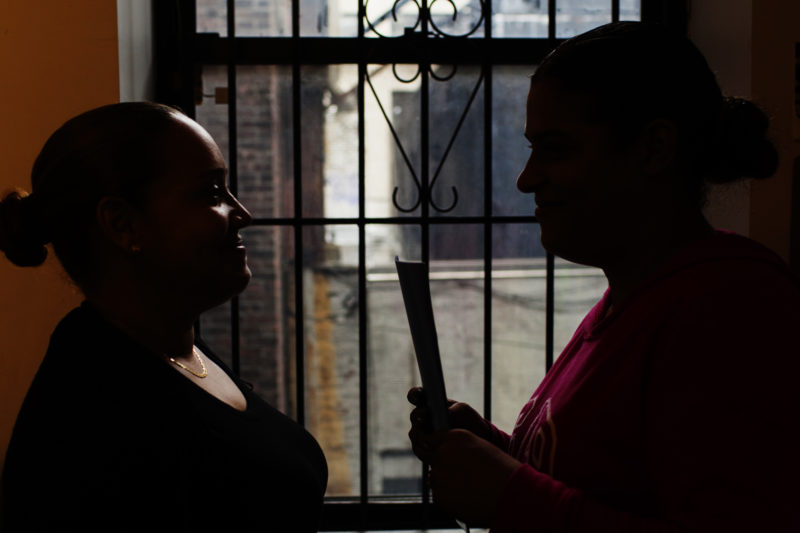
INTERVIEW BY RISE PARENT LEADERS
When you’re investigated by child protective services, you have to make decisions every step of the way. You have to decide what information to share, whether to enroll in services, and, if you wind up with a case, whether or not to go to trial.
You can’t know for sure what will help or hurt your situation. But the more you know about investigations, the better able you are to make educated decisions. Here Jessica Weidmann, a lawyer formerly with the Center for Family Representation in New York, explains parents’ rights:
Q: Why is it important for parents to know their rights?
A: When you’re being questioned by a person in authority, you can think that you have to do everything they say. Knowing your rights can help you understand that you also have power.
But how you exercise your rights is also important.
I’ve had cases that begin in court with CPS describing how the parent reacted to the investigation—by becoming very angry, screaming, or sometimes destroying property. Those reactions often come from a place of frustration and fear. But they can become part of a picture the worker is building of a parent who is willing to resort to violence. How you react to CPS can make a difference in your case.
Q: Do parents have the right to refuse entry to an investigator?
A: Yes. But refusing entry to CPS will not end the investigation. If CPS has information that a child may be in danger, they have the authority to go to court to ask for a court order—similar to a search warrant—requiring you to allow them access. CPS must give you notice if they intend to do this, and you have a right to go to that court hearing. In an emergency, CPS can also return with the police without a court order.
If you’re confident that there’s nothing to be seen in your home that raises red flags, you may want to allow entry, since denying entry may make the worker see you as uncooperative.
If you do refuse entry, how you do it can make a difference. You might say, “I’d like to have this conversation with you at a later date,” or, “I’d like to have this conversation with you when I have my husband here.” The suggestion of an alternative time can help build a respectful relationship.
Q: Do parents have the right to know what they are being investigated for?
A: Yes. It’s one of first questions parents should ask an investigator. In addition, at any stage in the investigation, the parent has the right to write to the State Central Registry requesting all documentation against them.
Q: Should parents answer all the questions they are asked?
A: Before answering questions, I would encourage anyone under investigation to ask questions. Those include: What were the allegations made against me? What exact information are you looking for? What exactly are your concerns?
You do have a right to refuse to answer questions, so if you’re told the allegations are about domestic violence, but they’re asking you about something else entirely, you may want to say, “I don’t think that question is relevant to the concerns you’ve raised.” One thing you don’t want to do is minimize serious concerns. You want your answers to reduce concerns, not raise more concerns.
If you’ve had prior cases, CPS is required to ask you about them. If you have addressed any problems you were struggling with in the past, it’s a good idea to explain how you’ve done that.
Q: Can parents refuse to let the investigator interview their children, or insist on being present during the interview?
A: If it’s in your own home, you can, but investigators are also required by law to interview your children. If they’re unable to, or think your children are not going to speak honestly with you present, they will go to court to require that you bring your children to a different location to be interviewed without you. They also have the right to interview your child in school without your permission.
Still, there may be times when you want to insist on being present—for instance, if your child has a disability that may make them scared or confused. In that situation, you can explain your reason. You can also ask that your child be interviewed at a Child Advocacy Center, where there’ll be an investigator and a mental health professional present.
Q: Can CPS mandate services during an investigation?
A: CPS workers will sometimes say that services are mandated but nothing is really mandated until you go to court and the judge orders it. That said, if you understand the safety concerns that CPS has about you, any steps you take to address those concerns may help, including voluntarily participating in services.
You also have the right to tell CPS, “I’d rather do this program in a different place,” or, “Here’s why I think a different service makes more sense.” Before you engage in any services you’ve found on your own, though, you should find out whether that service is approved by CPS.
Interview by Bevanjae Kelley, Sara Werner, Jeanette Vega, Nicole Goodwin, Piazadora Footman and Nancy Fortunato
